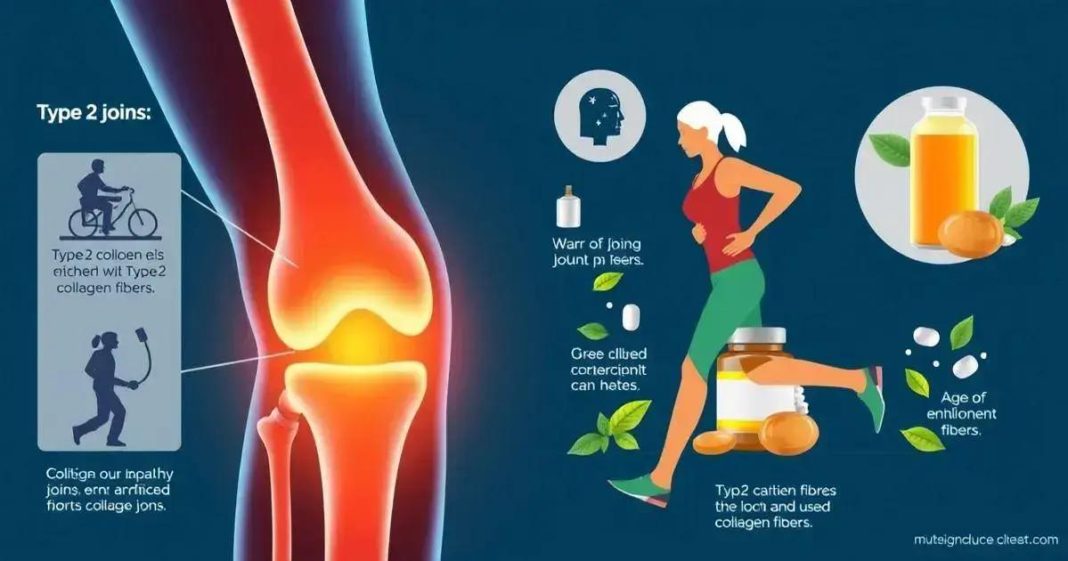To naturally boost collagen production for youthful skin and strong joints, incorporate foods rich in vitamin C and amino acids, stay hydrated, avoid excessive sun exposure, and consider collagen supplements. These strategies can enhance collagen levels, promoting better skin and joint health for a more vibrant lifestyle.
Type 2 collagen for joints is a specialized form of collagen that plays a critical role in maintaining the structure and function of cartilage. As the primary component of cartilage, type 2 collagen helps provide strength and elasticity, making it essential for joint health. With age and wear and tear, collagen levels naturally decline, leading to joint discomfort and stiffness. In this article, we’ll delve into the benefits of type 2 collagen for joints and how it can enhance mobility and overall joint well-being.
What is Type 2 Collagen?
What is Type 2 Collagen? Type 2 collagen is a specific form of collagen that is primarily found in cartilage, the flexible tissue that cushions joints. It is crucial for maintaining the structural integrity and functionality of joints, making it particularly important for individuals experiencing joint pain or discomfort.
1. Composition: Type 2 collagen consists of tightly packed fibers that provide strength and resilience to cartilage. It is made up of amino acids, including glycine, proline, and hydroxyproline, which are essential for forming the collagen triple helix structure.
2. Function: The primary function of type 2 collagen is to provide support and elasticity to cartilage. It helps maintain the shape of joints and ensures they can absorb shock and withstand pressure during movement. This cushioning effect is vital for protecting bones and preventing injuries during physical activities.
3. Differences from Other Types of Collagen: While there are several types of collagen in the body, type 2 collagen is distinct from type 1 and type 3 collagen, which are mainly found in skin, bones, and blood vessels. Type 1 collagen provides tensile strength, while type 3 collagen supports skin and blood vessel structure. Type 2 collagen, on the other hand, is specialized for maintaining cartilage health.
4. Role in Joint Health: As we age, the natural production of type 2 collagen decreases, leading to a decline in cartilage health. This can result in conditions such as osteoarthritis, where joint pain and stiffness become more pronounced. Supplementing with type 2 collagen can help replenish these levels and support overall joint health.
In summary, type 2 collagen is a critical protein for joint health, providing the necessary support and structure to cartilage. Understanding its role in the body can help individuals make informed decisions about their joint care and explore potential benefits of supplementation.

How Type 2 Collagen Benefits Joint Health
How Type 2 Collagen Benefits Joint Health is an essential topic for anyone looking to maintain or improve their joint function.
Here are several key benefits of type 2 collagen for joint health:
1. Supports Cartilage Structure: Type 2 collagen is a major component of cartilage, providing the necessary support and strength. By maintaining the structural integrity of cartilage, it helps protect the joints from wear and tear during physical activity.
2. Reduces Joint Pain: Research has shown that type 2 collagen supplementation can significantly reduce joint pain, especially in individuals with osteoarthritis. By replenishing collagen levels in the cartilage, it helps alleviate discomfort and improve mobility.
3. Improves Joint Function: Regular intake of type 2 collagen has been linked to enhanced joint function. It can help increase flexibility and range of motion, allowing individuals to engage in daily activities without discomfort.
4. Promotes Cartilage Repair: Type 2 collagen plays a crucial role in cartilage repair and regeneration. By providing the necessary building blocks for collagen synthesis, it aids in repairing damaged cartilage and promoting healing in the joints.
5. Reduces Inflammation: Type 2 collagen may help reduce inflammation in the joints, contributing to decreased swelling and pain. This anti-inflammatory effect is particularly beneficial for individuals with chronic joint conditions.
6. Enhances Synovial Fluid Production: Type 2 collagen supports the production of synovial fluid, which lubricates the joints. Increased lubrication helps reduce friction between cartilage surfaces, leading to smoother joint movement and less discomfort.
In summary, type 2 collagen offers numerous benefits for joint health, including support for cartilage structure, pain reduction, improved function, cartilage repair, inflammation reduction, and enhanced lubrication. Incorporating type 2 collagen into your routine can lead to significant improvements in joint health and overall quality of life.
Sources of Type 2 Collagen
Sources of Type 2 Collagen are crucial for those looking to enhance their joint health through dietary means or supplementation. Here are some of the primary sources of type 2 collagen:
1. Animal-Based Sources: Type 2 collagen is predominantly found in various animal tissues, particularly cartilage:
- Chicken Cartilage: Chicken, especially the cartilage found in chicken wings and feet, is one of the richest natural sources of type 2 collagen.
- Fish Cartilage: Fish, particularly those with bones and skin, contain significant amounts of type 2 collagen. Fish cartilage supplements are also available.
- Bovine Cartilage: Cattle-derived collagen, often sourced from the trachea or nasal cartilage, is another rich source of type 2 collagen that is commonly used in supplements.
2. Collagen Supplements: For those who may not consume enough collagen through their diet, supplements are an effective way to increase type 2 collagen intake:
- Type 2 Collagen Powder: Available in hydrolyzed form, type 2 collagen powders can be mixed into beverages, smoothies, or other foods for easy consumption.
- Capsules and Tablets: Type 2 collagen is also available in capsule or tablet form, providing a convenient option for supplementation.
- Liquid Collagen: Some products offer type 2 collagen in liquid form, which may be easier to digest and absorb.
3. Bone Broth: While bone broth primarily contains type 1 collagen, it also contains some type 2 collagen, particularly when made from chicken bones. Bone broth is a nutritious option for supporting overall collagen intake.
In summary, incorporating both dietary sources of type 2 collagen and considering supplementation can significantly contribute to joint support and overall joint health. A balanced diet rich in collagen-promoting foods, combined with high-quality type 2 collagen supplements, can help maintain joint function and reduce discomfort.

Type 2 Collagen Supplements: Do They Work?
Type 2 Collagen Supplements: Do They Work? is a common question for individuals looking to improve their joint health through supplementation. Understanding the effectiveness of these supplements involves examining scientific research and user experiences.
1. Research Evidence: Numerous studies have investigated the benefits of type 2 collagen supplements, particularly for individuals with joint issues such as osteoarthritis. Research findings indicate that:
- Type 2 collagen supplementation can lead to significant reductions in joint pain and stiffness, improving overall joint function.
- Clinical trials have shown that participants taking type 2 collagen reported greater improvements in joint comfort compared to those taking a placebo.
- Some studies suggest that type 2 collagen may help stimulate the body’s natural collagen production, further enhancing joint health.
2. Variability in Results: While many users report positive outcomes from type 2 collagen supplementation, individual results can vary based on several factors:
- Severity of Joint Issues: Those with more severe joint conditions may experience different benefits compared to individuals with mild discomfort.
- Dosage and Form: The effectiveness can depend on the dosage taken and the specific form of collagen (powder, capsule, or liquid).
- Overall Health and Lifestyle: An individual’s overall health, diet, and lifestyle can influence how well they respond to supplementation.
3. Safety and Side Effects: Type 2 collagen supplements are generally considered safe for most individuals with few reported side effects. However, it is essential to consult with a healthcare professional before starting any new supplement, especially for those with allergies or pre-existing health conditions.
4. Conclusion: Overall, while type 2 collagen supplements can be effective for many individuals seeking to improve joint health, results may vary. It is important to approach supplementation as part of a comprehensive strategy that includes proper nutrition, exercise, and professional guidance. By incorporating type 2 collagen into your routine, you may experience significant improvements in joint comfort and function.
Incorporating Type 2 Collagen into Your Diet
Incorporating Type 2 Collagen into Your Diet is a practical approach to enhancing joint health and overall well-being. Here are several effective strategies to help you easily add type 2 collagen to your daily routine:
1. Consume Collagen-Rich Foods: Integrate foods that are natural sources of type 2 collagen into your diet:
- Chicken Cartilage: Enjoy chicken dishes that include skin and cartilage, such as chicken wings or feet, to increase your type 2 collagen intake.
- Bone Broth: Incorporate homemade or store-bought bone broth into your meals. Use it as a base for soups, stews, or sauces to benefit from its collagen content.
- Fish: Include fish, especially those with skin, in your diet to provide natural sources of collagen.
2. Utilize Collagen Supplements: For those who may not get enough type 2 collagen from food sources, supplements are an effective way to boost intake:
- Type 2 Collagen Powders: Add type 2 collagen powder to your smoothies, shakes, or yogurt for a convenient way to increase your collagen intake.
- Capsules and Tablets: Consider taking type 2 collagen supplements in capsule or tablet form for easy daily consumption.
- Liquid Collagen: Some brands offer liquid collagen supplements that can be consumed directly or mixed into beverages.
3. Combine with Nutrient-Rich Foods: Enhance the effectiveness of type 2 collagen by combining it with foods rich in vitamin C and other nutrients that support collagen synthesis:
- Citrus Fruits: Pair your collagen intake with vitamin C-rich fruits like oranges, lemons, and strawberries to boost collagen production.
- Leafy Greens: Incorporate vegetables like spinach and kale, which provide antioxidants that support overall joint health.
4. Stay Consistent: To see the benefits of type 2 collagen, consistency is key. Make it a habit to include collagen in your diet regularly, whether through food or supplements, to support long-term joint health.
In summary, incorporating type 2 collagen into your diet can be achieved through a variety of delicious and practical methods. By making small adjustments to your meals and considering supplements, you can enhance your collagen intake and support your joint health effectively.
Conclusion
In conclusion, type 2 collagen is a vital protein that plays a crucial role in supporting joint health by providing structure, strength, and lubrication to cartilage.
Understanding the benefits of type 2 collagen, including pain reduction, improved joint function, and support for cartilage repair, can empower individuals to take proactive steps toward maintaining their joint health.
Incorporating type 2 collagen into your diet through natural food sources like chicken cartilage and bone broth, as well as considering high-quality supplements, can significantly enhance your overall well-being.
By prioritizing type 2 collagen intake and making it a consistent part of your routine, you can support your joints and enjoy a more active, pain-free lifestyle.
As always, it is important to consult with a healthcare professional before starting any new supplement regimen to ensure it aligns with your individual health needs and goals.
With the right approach, you can significantly improve your joint health and quality of life.
FAQ – Frequently Asked Questions about Type 2 Collagen and Joint Health
What is type 2 collagen and why is it important for joints?
Type 2 collagen is a specific form of collagen found primarily in cartilage, providing support and structure essential for joint health.
How does type 2 collagen benefit joint health?
Type 2 collagen helps reduce joint pain, improves joint function, supports cartilage repair, and enhances lubrication in the joints.
What are some food sources of type 2 collagen?
Food sources include chicken cartilage, fish, and bone broth, which are rich in type 2 collagen.
Are type 2 collagen supplements effective for joint health?
Yes, many studies indicate that type 2 collagen supplements can improve joint function and reduce pain, particularly in individuals with osteoarthritis.
How can I incorporate type 2 collagen into my diet?
You can incorporate it through collagen-rich foods like chicken and bone broth, or by taking type 2 collagen supplements in powder, capsule, or liquid form.
Is it safe to take type 2 collagen supplements?
Type 2 collagen supplements are generally considered safe for most individuals, but it’s advisable to consult with a healthcare professional before starting any new supplement.


